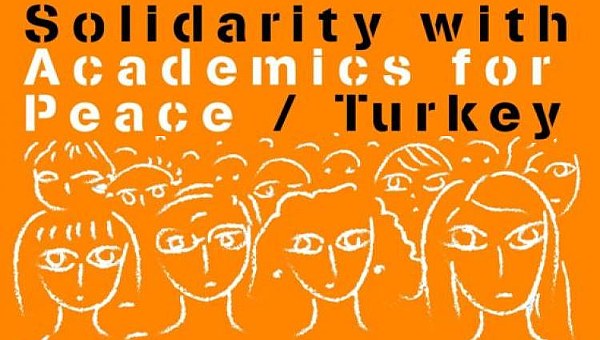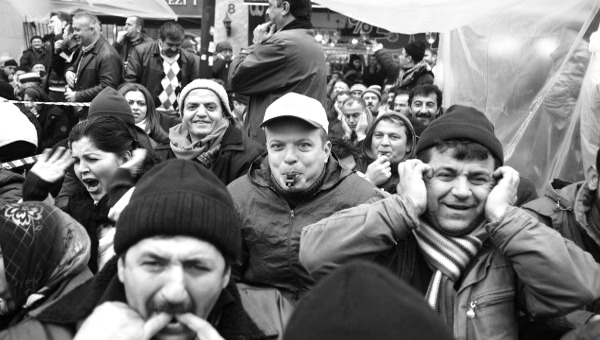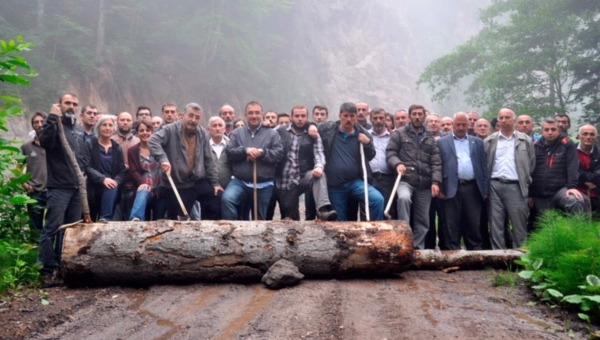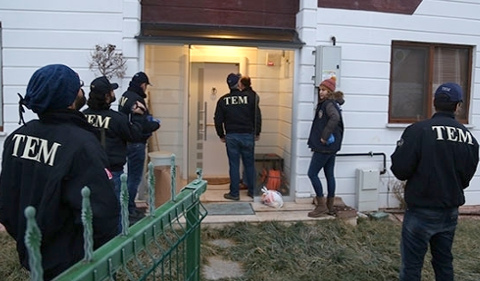Reflections on a Popular Uprising and Weakened Organized Labour
The recent wave of resistance that spread from a park in one of the historic neighbourhoods of Istanbul, Turkey has evoked significant enthusiasm in and support from various movements and segments of populations in several countries. Although the park, which had been a temporary home for thousands of protestors for a couple of weeks, was forcibly and violently evacuated by the police on June 16th, the resistance continues in different forms and in numerous locations, both within and outside of Turkey. This unexpected and abrupt rebellion in a country, which has been presented for a decade by many international organizations and governments as a role model for the rest of the Middle East with its commitment to market reforms and ‘democratization,’ was a response to a number of factors and ongoing processes. If the most predominant of these were the increasingly authoritarian nature of the AKP (Justice and Development Party) rule, the others were the further neoliberalization of Turkish society, the utter failure of an increasingly interventionist Turkish foreign policy in the Middle East, and a complete disregard for and destruction of the environment in the service of capital across the country.

Where Was Organized Labour?
It is important to reiterate that this was truly a popular rebellion or uprising that has drawn different segments of society that has historically and currently been divided along ethnic, religious and class lines. What was disappointing in this process was the weakness of the participation and lack of leadership of organized labour. In this piece, we will limit our discussion to the reasons for this failure on the part of the progressive segments of organized labour. It will be argued that organized labour’s weak participation and lack of leadership throughout the Gezi process are a result and symptomatic of both the worldwide socio-economic transformations taking place since the 1970s and the specificities of the AKP rule as the most recent stage of neoliberalism in Turkey.
Let’s start with the following question: If it were not unionized workers or members of (left or bourgeois) political parties, who were the two and a half million people,1 if not more, who came out and filled the squares and streets, resisting police brutality and repression around the country? The first protests were against the tearing down of a few trees in Taksim Gezi Parki with heavy construction vehicles on May 27. To prevent the partial destruction of one of the few remaining green spaces in the city, a bunch of young environmentalists, whose numbers did not exceed a few hundred, set up their tents in the park on the following day. The critical date that triggered a series of demonstrations and opened Pandora’s Box was May 29 when the police raided the camp and attacked the group with intensive tear gas and water cannons when the protestors were asleep at dawn. As if gassing people and using water cannons were not enough, the police and city workers also set the tents of these environmentalists on fire. The images of such police brutality in both the mainstream (with a few days’ delay!) and critical media reached millions of viewers, as the people witnessed unprovoked police violence against a peaceful democratic protest.
The visits of some well-known and left MPs like Sirri Sureyya Önder, a Turkish member of the Kurdish Peace and Democracy Party (BDP), led to broader media coverage of the brutal attack by the police. On May 30th, tents were set up again but this time, the number of protestors had significantly increased with the newcomers, who were mainly composed of members of revolutionary groups. What turned this modest and not so significant protest into a mass protest or movement was the intensive use of tear gas, plastic bullets and water cannons by the police and the anger at the mainstream media that ignored and refused to address this brutality. Very soon hundreds of thousands would take to the streets and occupy the Gezi Parki and several other squares and streets around the country.
Composition of the Protesters
When we look at the composition of the protesters, it looks like this rebellion is not a typical working-class rebellion. Many commentators and analysts have pointed out the ‘middle class’ character of the opposition. It has been argued that what we are witnessing is a mostly ‘middle class’ response to the imposition of a particular way of life and social discipline on a population that is anything but monolithic and unified in its worldview as well as ways of life. According to the statistics compiled on the protestors in Taksim Gezi Parki in the first two weeks of the rebellion, 79 per cent of these people had never participated in a demonstration before; and 93.6 thought they did not represent any social group and are merely simple citizens. As regards the reasons as to why they frequented the park, 58.1 per cent mentioned restrictions on freedom, 37.2 per cent the AKP and its policies, 30.3 per cent Erdogan’s discourse and attitude, 20.4 per cent the tearing down of trees and 19.5 per cent opposition to the state.
However, we should be wary about this vague term, i.e. ‘middle classes,’ if we want to have a more rigorous and more accurate analysis of the composition of the participant masses and their motivations. When we look a little closer, we can see that a significant part of these so-called ‘middle’ classes that have taken the lead are the waged, white-collar segments of the working population joining thousands of students, academic workers, the unemployed, precarious workers, the ultras of various soccer clubs, etc. in a country that has been going through an intense period of neoliberalization since the 1980s. The AKP decade (2002-2013) constitutes the most recent stage of this process in which the entire society and the state are being disciplined and (further) restructured along neoliberal lines. These so-called middle classes, or to be more specific, the waged white collar members of the working-class, i.e. doctors, lawyers, IT workers, teachers, engineers, etc., are the ones who are rapidly losing their once relatively privileged status. The neoliberal restructuring of the labour markets coupled with the most recent global crisis has pushed these segments of the working population to an increasingly vulnerable position (Burkev 2012). However, the immediate and current reaction of a significant part of this social group to the AKP government, which has skillfully combined neoliberalism with Islamic conservatism, has assumed a nationalist and secularist form instead of a class one. While the grievances and anger of these groups could have been channelled into a broader and left political project targeting the neoliberal assault as much as the increasingly authoritarian and socially conservative rule of the AKP, the weakness of the organizations of labour has rendered this almost an impossibility.
The State of the Union under Turkish Neoliberalism
Some of the organizations of labour, which include several political parties and socialist journal circles, were all present on the ground with their members and banners when the Taksim Square and Gezi Parki were occupied by demonstrators. However, while workers participated individually and contributed significantly to the resistance, the labour unions’ record, in particular, throughout the rebellion has been beyond disappointing. Their presence in and support for the rebellion seemed almost reluctant and they failed to provide leadership and make a meaningful contribution despite their three separate calls for a general strike, all of which failed to mobilize their membership. This marks a low point for organized labour in the past 50 years.
Labour rights have never been a priority and they have systematically been ignored and violated in the republican era except for a brief interval between 1960 and 1980. If we just focus on the neoliberal period starting after the military take-over in 1980 however, the AKP years have been the worst with regard to unionization and the strength of progressive unions in particular. Today, Turkey ranks the last regarding unionization among the OECD countries. At the same time, it ranks the first when it comes to de-unionization as a result of the 38 per cent drop in the unionization rate between 2002 and 2011 among those workers who can legally participate in collective agreements. It becomes even more alarming when we observe that de-unionization has taken place in a period in which the number of workers eligible for union membership has increased from 10.5 million in 2002 to 14.9 million in 2011. Despite this widening of the potential union base, the unionization rate has fallen from 10 per cent to less than 6 per cent in the same period (Celik 2012). The picture becomes even bleaker if we extend our time period to 1988 when the unionization rate was 22 per cent. What is even more troubling is the quite low unionization rate in the private sector, which fell from 7.8 per cent in 1995 to 3.5 per cent in 2010 (Sosyal-Is 2012).
| Unionization in Turkey | |||
|---|---|---|---|
| Year | Workers Covered by Collective Agreements | Total Number of Workers | Unionization Rate (%) |
| 1988 | 1,591,360 | 7,170,000 | 22.2 |
| 1995 | 1,144,989 | 8,471,000 | 13.5 |
| 2002 | 1,007,305 | 10,625,000 | 9.5 |
| 2003 | 957,418 | 10,707,000 | 8.9 |
| 2004 | 919,364 | 11,344,000 | 8.1 |
| 2005 | 933,537 | 12,360,000 | 7.6 |
| 2006 | 902,247 | 12,999,000 | 7 |
| 2007 | 831,335 | 13,573,000 | 6.1 |
| 2008 | 750,018 | 12,937,000 | 5.8 |
| 2009 | 748,399 | 12,770,000 | 5.9 |
| 2010 | 805,525 | 13,762,000 | 5.9 |
| Unionization in the Private Sector | |||
| Year | Workers Covered by Collective Agreements | Number of Workers | Unionization Rate (%) |
| 1995 | 437,788 | 5,584,000 | 7.8 |
| 2002 | 415,972 | 7,483,000 | 5.6 |
| 2003 | 392,881 | 7,675,000 | 5.1 |
| 2004 | 401,002 | 8,510,000 | 4.7 |
| 2005 | 424,457 | 9,305,000 | 4.6 |
| 2006 | 399,656 | 9,918,000 | 4 |
| 2007 | 361,430 | 10,572,284 | 3.4 |
| 2008 | 315,637 | 10,019,124 | 3.2 |
| 2009 | 335,843 | 9,811,149 | 3.4 |
| 2010 | 380,218 | 10,748,388 | 3.5 |
Source: Sosyal-Is Sendikasi 2012.
This negative trend in unionization is not specific to Turkey but has been a worldwide phenomenon in the past 30-35 years. Factors such as privatization of public enterprises and contraction of the public sector, the expansion of the service sector at the expense of industry, outsourcing, the spread of precarious forms of employment, and flexibilization of labour markets have led to hemorrhaging for unions around the world and to overall de-unionization. However, what we have witnessed in Turkey is staggering. The fall in the rate of unionization within the OECD has been 11 per cent while it has been 38 per cent in Turkey in the past ten years. The unionization rate stands at around 17 per cent in OECD countries today; that rate is a pitiful 6 per cent in Turkey (Celik 2012).
This downward trend cannot be explained by the general, worldwide socio-economic changes alone. The extent of the erosion of the size and power of organized labour in Turkey, therefore, requires special attention to the domestic factors specific to Turkey in addition to the ongoing global socio-economic trends. Here, we can talk about a number of indigenous factors. Firstly, the employment legislation that came into effect after the 1980 military takeover served a critical role in weakening labour. The two pieces of legislation, Bill no. 2821 (The Trade Unions Act) and Bill no. 2822 (The Collective Agreements, Strike, and Lockout Act), which were introduced by the junta in accordance with the demands of the Confederation of Employers’ Unions of Turkey, have been among the greatest obstacles to unionization in the country. Bill no. 2821 until it was repealed late in 2012 had contained various restrictions on the right to strike. This legislation, with its 10 per cent branch and 50+1 per cent shopfloor thresholds as well as a number of other undemocratic clauses, acted as a formidable obstacle to unionization. The most problematic of these undemocratic clauses has arguably been regarding authorization of labour unions. It has been the Ministry of Labour and Social Security that determines whether or not a particular union passes the branch or sectoral threshold to represent workers. This has resulted in partisan decisions favouring those unions allied with or close to the government.
What is more, until it was repealed in 2012, the legislation permitted the suspension of the collective agreement procedure/process once the employer or the rival union disputed the pre-authorization granted by the ministry. In such cases, court cases trying to determine if the union has authorization or not could last for years and during the course of the case, the union was not able to engage in any union activity in that particular workplace. Many employers took advantage of this situation and used this opportunity to force the unionized workers to resign or to lay them off. Although these two laws were repealed or united with some modifications under one law (Bill no. 6356) in November 2012, the spirit of the two laws has remained the same despite the lip service paid to the criticisms regarding lack of compliance with international labour standards (Keskin 2012).
In addition to the unfavourable legal framework, a number of practices have contributed to the sharp decline in unionization. These have included laying off of unionized workers and replacing them with new workers, thereby depriving the union in the workplace of its authorization to enter into collective bargaining; getting imams at mosques to preach against unionization; offering workers (financial) assistance in addition to their wages to discourage them from getting unionized; forcing workers to leave their current union and become members of pro-employer unions; intimidating workers with threats and physical violence, etc. (Celik 2012). Outsourcing has become another important factor affecting unionization and the power of existing unions. According to the statistics provided by the Ministry of Labour and Social Security, the number of workers employed by subcontractors has increased from 350,000 to more 1.5 million only in the course of ten years (Yerdeniz 2013). The sectors in which outsourcing is the most common are cleaning services (public) and construction (private). The largest customers are municipalities, state-owned enterprises and higher education institutions (Celik 2012). Outsourcing has become a very effective tool for the AKP government to deprive workers in both the private and public sectors of their rights or effective use of their rights.
The AKP and Unions: Tutelary Unionism
In addition to creating an economic and legal context that has exacerbated the state of organized labour via deunionization, the AKP has also initiated a process of cooptation of organized labour the extent and intensity of which has been unprecedented. Here, we can talk about ‘tutelary unionism.’ This kind of unionism has always been a malady of the labour movement in Turkey. However, under the AKP rule it has reached a significant level, especially among the unions of public servants.
| Major Public Service Unions | |||
|---|---|---|---|
| Confederation | 2002 | 2012 | Change (%) |
| Memur-sen | 42 | 650 | 1448 |
| Kamu-sen | 329 | 418 | 27 |
| KESK | 262 | 240 | -8 |
As the table indicates, there was an increase on the order of 107 per cent in the number of unionized public servants between 2002 and 2012. The interesting aspect of this process is the spectacular boom in the membership of one confederation, i.e. Memur-sen, whose membership grew by a miraculous 1448 per cent. We don’t need to mention that this is a confederation closely allied with the AKP. While Kamu-sen, the nationalist confederation, too, increased its membership, the progressive KESK saw some decline in the past decade. KESK, as the only confederation that is a member of both ITUC and ETUC among the big three, found itself in a difficult position during the Gezi events. Although it declared its support for the demonstrations and called for a strike in response to police brutality and violation of democratic rights, it was still reluctant and/or was unable to mobilize greater numbers and assume a leadership role. This stemmed from the confederation’s close ties with the Kurdish movement and the latter’s anxiety that giving support to the Gezi process could jeopardize the ongoing ‘peace process’ regarding the Kurdish question. Also, the secular weakening of the confederation since 2002, when it represented 40 per cent of all organized public servants, contributed further to the confederation’s inability to gather enough numbers and assert its position within the larger labour movement. As a result, many unions affiliated with KESK either did or were not able to mobilize their members and participated in the demonstrations at a symbolic level.
When we look at the blue collar workers’ unions, we see three confederations: The Confederation of Turkish Trade Unions (TÜRK-IS), the Confederation of Real Trade Unions (HAK-IS) and the Confederation of Revolutionary Trade Unions (DISK). TÜRK-IS, the biggest confederation, has 702,000 members, HAK-IS 166,000, and DISK about 100,000. In the case of the Gezi protests, the only relevant confederation has been DISK, as HAK-IS and large parts of TÜRK-IS did not support the uprising. DISK has played a central role in Turkish politics and class struggle since the late 1960s. However, it has been directly affected by the broader social transformation in the past 10 years and has not been able to remain immune, unlike KESK, from this process despite its more progressive stance among the three confederations.
While KESK membership has been able to preserve its socialist stance and identity in this period, DISK has undergone some change with respect to the political orientation of its members. This is mostly a consequence of the Turkish law that allows multiple labour organizations in the same workplace in the public sector but bans it in the private sector. This creates an intense competition in the workplace for private sector unions and forces them, especially the weaker one(s), to make concessions to the members should the latter’s political stance start to deviate from that of the confederation or the member-union. This pressure has been particularly felt by DISK, leading to a change in the politics of some of its member-unions. An interesting fact is that it is not uncommon that the workers of several municipalities run by the AKP have been organized by Genel-Is, a DISK affiliate. Of course, it is redundant to mention that in this trade the DISK-affiliates adopt a very mild political tone, refraining from touching on issues such as capitalism, religious conservatism, the Kurdish issue and the AKP policies in their training seminars or discussions.
To sum up, the contribution of organized labour in general and its progressive/socialist elements in particular during the Gezi process has been quite disappointing. Although this process provided the labour movement with a unique and unprecedented opportunity to assume a leadership role and channel the anger, creativity and energetic resistance of the popular masses into anti-neoliberal politics, the progressive elements of the labour movement have failed to seize that opportunity. This has been the consequence as much of the worldwide social, economic and political transformations under neoliberalism in the past 30-plus years as the specificities of the Turkish context and of the AKP rule in the past decade. It should, at the same time, be emphasized that this failure by the labour movement to assume a leadership role and to channel the protests toward class politics does not, in any way, diminish the significance and value of what we have been witnessing in the past month. The participants of this rebellion, through their discourse and practice, have called into question and surpassed the existing organizations of the left by their persistence, inclusivity and novel forms of democratic organization and resistance. Labour and its organizations have a lot to learn from these formerly apolitical, apathetic and currently revolutionary people. And despite all the damage he has inflicted on the peoples and classes of Turkey, we have to thank Tayyip Erdogan for giving us a new generation that is not afraid to act and speak up. •





